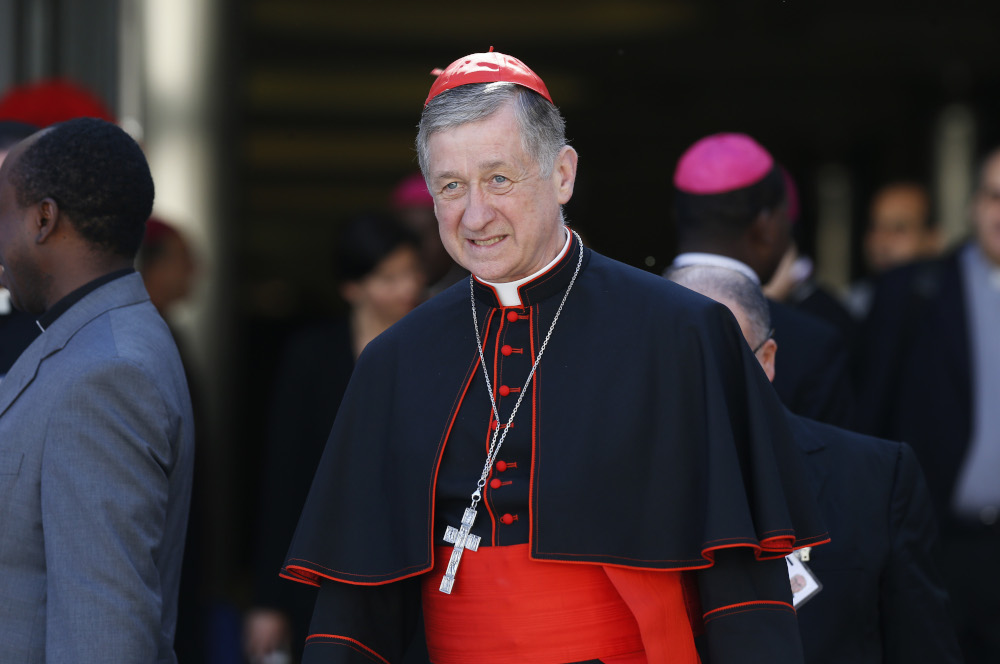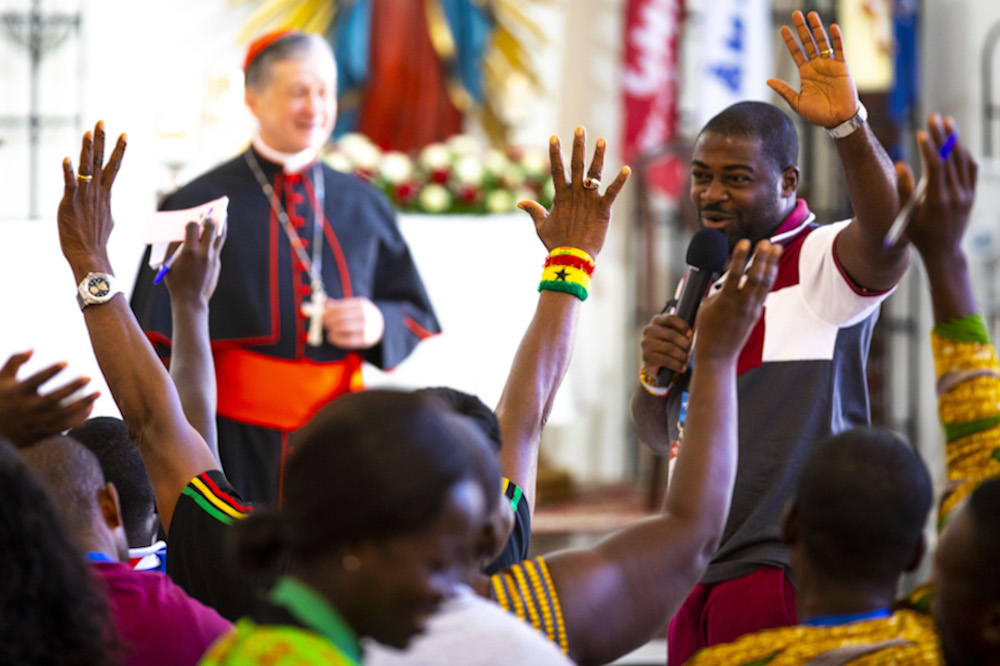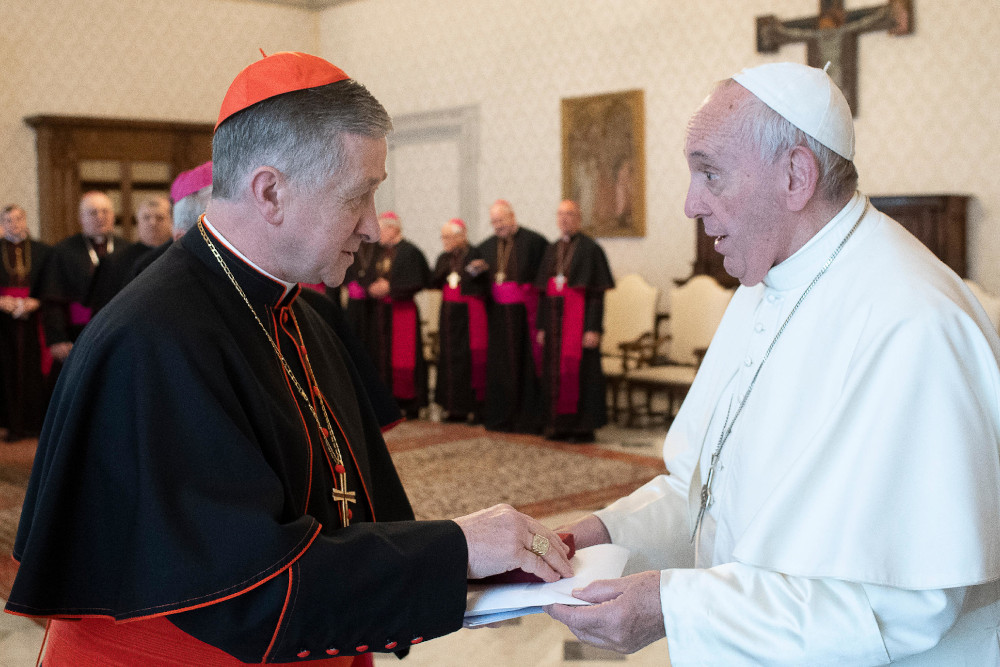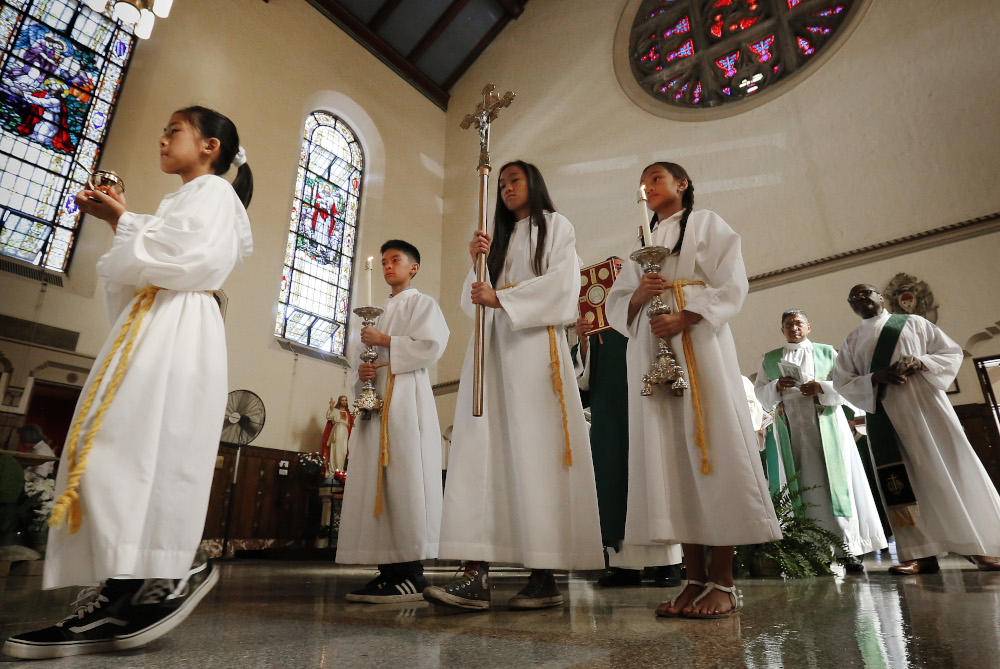
Chicago Cardinal Blase Cupich is pictured during the Synod of Bishops on young people, the faith and vocational discernment at the Vatican Oct. 18, 2018. (CNS/Paul Haring)
Editor's note: Cardinal Blase Cupich, the archbishop of Chicago, spoke Jan. 25 at this year's annual Catholic Social Ministry Gathering in Washington, which brings together Catholic activists from across the country. This year was the first time the Catholic Social Ministry Gathering was timed to coincide with the annual March for Life. Cupich spoke about the relationship between the universal call to holiness and the church's ministry promoting justice and human dignity. Here is the text of his speech as prepared for delivery.
Thank you for your warm welcome. My first words to you are filled with great appreciation, for I know I stand before leaders who are key to the Catholic social ministry in the U.S. You all share a deep faith in Jesus Christ that inspires you on a daily basis to respond with dedication and personal sacrifice to the pressing domestic and global challenges of our day. The theme of your gathering, "Bearing Witness: Life and Justice for All," while a vision for the entire Church, is in reality a description of what do you each day.
You asked me to briefly speak on the connection between the work of promoting human dignity and justice for all and our baptismal call to holiness. Too often we begin such discussions about how we are to live our baptismal call by citing things that we are doing or should do, especially for the least in our midst. What I find unique in the teaching of Pope Francis is that he inverts the discussion. Instead of starting with what we are doing or should do, his attention is on what Christ is doing. He understands that the pursuit of a holy life is about encountering this Christ who is already active and present, and joining in his saving work of building the Kingdom of God. Christ is the one who takes the initiative, not us. And as the first pope to be a "son of the Second Vatican Council," Francis is particularly attentive to its insights as he invites the Church to pay attention to Christ's saving action in the world. This is what it means to read the signs of the times.
In Gaudium et Spes, the Council Fathers prophetically declared that something new is happening in our era: we are witnessing the "birth of a new humanism, where people are defined first of all by their responsibility to their brothers and sisters and to history" (Gaudium et Spes 55). This new appreciation of our relationships with one another as the place where God is at work opens up a new way of being Church and of understanding our baptismal call. It makes us more aware of the need for a consistent ethic as we promote human dignity and justice for all. It also helps us achieve a proper balance as the Church engages the world of politics and as we take up our ministry to the least in our midst. Let's take a look at each of these areas.
In this era of a new humanism, it is not surprising that the Council Fathers retrieved from our tradition the biblical vision of the Church as the People of God. In Lumen Gentium, they reminded us that God's plan from the beginning was to make us holy and save us "not as individuals, without a bond or link between one another, but to bring them together as one people" (Lumen Gentium 9). This teaching stands in stark contrast to the not-so-subtle message of so much American public discourse today — namely that what matters most is the individual person, choice, personal freedom. What the Council Fathers wanted to underscore was that it is in our relationship with one another as a human community that we are saved. This is where God works and manifests himself in bringing about the Kingdom of God.
This opens up a new way of being Church. Lucio Gera, an Argentinian theologian who has greatly influenced Pope Francis, writes that in the vision of the Council, "(T)he Church takes place as intercommunion between human beings — not only as relationship of humans with God but as interrelationship of human beings among themselves. The relationship with the other is not simply something added to a Church already constituted by a relationship with God. The relationship with the other is also constitutive of the Church, that is, it is set within the very essence of being Church" (Escritos teológico-pastorales de Lucio Gera, 358, as cited in Pope Francis and the Theology of the People, Rafael Luciani, 4). Priority is given to fostering human relationships when we think of salvation history, which differs from a view of religion or religious practice simply in terms of institutional belonging or increasing "market share." And as Pope Francis reminds us in Evangelii Gaudium, since "(B)eing Church means being God's people, in accordance with the great plan of his fatherly love … (then) we are to be God's leaven in the midst of humanity … proclaiming and bringing God's salvation into our world, which often goes astray and needs to be encouraged, given hope and strengthened on the way" (Evangelii Gaudium 114).

A pilgrim from Ghana asks others from his country to raise their hands during a World Youth Day catechesis session lead by Chicago Cardinal Blase Cupich at the Parish of Our Mother of Perpetual Help in Panama City Jan. 25, 2019. (CNS/Chaz Muth)
Advertisement
Likewise, our Christian call to holiness is not about being called as an individual, but an invitation from God in which he brings people together and invites believers to a deeper level of human intercommunion and shared life. The proper task of a Christian, then, as the Council tells us, is to work with everyone in building a more human world (cf., Gaudium et Spes 55). This is about taking a stand toward reality in which neither our spiritual lives nor religion can be understood without social commitment. Nor can salvation be understood without the need to transform history. They are linked together. (See Rafael Luciani, Pope Francis and the Theology of the People, 3).
Such an approach also subverts any attempt to fragment our Catholic social teaching, pretending to offer so-called non-negotiables, which ends up reducing our moral tradition to a single set of issues. In Gaudete et Exultate, Pope Francis warns against such an "ideological error found in those who find suspect the social engagement of others, seeing it as superficial, worldly, secular, materialist, communist or populist. Or they relativize it, as if there are other more important matters, or the only thing that counts is one particular ethical issue or cause that they themselves defend." He goes on to say, "(O)ur defense of the innocent unborn, for example, needs to be clear, firm and passionate, for at stake is the dignity of a human life, which is always sacred and demands love for each person, regardless of his or her stage of development. Equally sacred, however, are the lives of the poor, those already born, the destitute, the abandoned and the underprivileged, the vulnerable infirm and elderly exposed to covert euthanasia, the victims of human trafficking, new forms of slavery, and every form of rejection" (Gaudete et Exultate 101).
What is needed is an integrated and consistent approach, with the priority being our attention to what Christ is doing, saving us by bringing us together, bringing about the Kingdom of God by creating a people. Absent this focus, we risk our call to holiness. "We cannot uphold an ideal of holiness," Francis observes, "that would ignore injustice in a world where some revel, spend with abandon and live only for the latest consumer goods, even as others look on from afar, living their entire lives in abject poverty" (Gaudete et Exultate 101). Likewise, he continues, "(W)e often hear it said that … the situation of migrants, for example, is a lesser issue. Some Catholics consider it a secondary issue compared to the 'grave' bioethical questions. That a politician looking for votes might say such a thing is understandable, but not a Christian, for whom the only proper attitude is to stand in the shoes of those brothers and sisters of ours who risk their lives to offer a future to their children" (Gaudete et Exultate 102).

Pope Francis talks with Chicago Cardinal Blase Cupich during a meeting of U.S. bishops from Illinois, Indiana, and Wisconsin making their "ad limina" visits to the Vatican Dec. 12, 2019. (CNS/Vatican Media)
As for the Church's relationship to politics, in a recent article in Civiltà Cattolica, Fr. Antonio Spadaro, SJ, warns Church leaders about the dangers of allying themselves with a political faction as if we can neatly divide the world "between good and evil, between wrong and right." The Church's job is not to discern which political, partisan or military force we should support in order for good to triumph. But, rather, Fr. Spadaro counsels, we have to talk to everyone, noting that "(T)his approach … is based on the certainty that the empire of good is not given to this world. … Worldly power is definitely desacralized … no political power is 'sacred.' "
Finally, being attentive to what Christ is doing in bringing about the salvation of the world has much to say about our ministry in promoting life and justice for all, especially the poor. The starting point must be a deep and loving respect for the poor, uniting with them, accompanying them, not to tell them what to do, but with an appreciation for the creative capacity to pursue the life God has always intended for them. This means recognizing that Christ is already at work in the lives of the poor. Those we serve are not objects of our charity. They don't exist to make ourselves feel better by offering our help. Rather, as Pope Francis often reminds us, we must see the poor for who they are: protagonists, subjects of their own history, but also worthy contributors to society, precisely because their unique experience has taught them what it means to belong to a people.
They teach us, Lucio Gera writes, that the "first condition of belonging to a people is the consciousness of needing others and this is, in the poor, a living and wounded consciousness. They are, therefore, more capable of being in solidarity — of giving to others and expecting from them — more capable of being a people…Hence, we lean toward designating as people the multitude of the poor." (L. Gera, "Pueblo, religión del pueblo e Iglesia" as cited in Pope Francis and the Theology of the People, Rafael Luciani, 16).
In the end, the more we appreciate the poor as subjects, as protagonists, never as instruments, they in turn can begin to evangelize us. Our relationship, then, becomes fully reciprocal.
In the end, the more we appreciate the poor as subjects, as protagonists, never as instruments, they in turn can begin to evangelize us.
Victor Fernandez elaborates on the unique contribution, the unique beauty of the poor, explaining: "We can find in the poor some profoundly Christian values: a spontaneous attention to the other, an ability to devote time to others and to go to another's aid without calculating time or sacrifice, while the more educated, with a more organized life, are unlikely to grant to others time, attention and sacrifice spontaneously with joy and disinterestedly." (El sensus poluli: la legitimidad de una teología desde el pueblo as cited in Pope Francis and the Theology of the People, Rafael Luciani, 14).
Similarly, Rafael Luciani, speaks about the "spontaneous moral wisdom" of the poor, which allows them to seek "a good greater than the immediate." He cites Rafael Tello's comment that, although (the poor) may "comply little or badly with some aspects of Christian morality due to the factors constraining them, nevertheless (they) have complied much more than the highly educated with other aspects of morality: first, (with) a spontaneous … and firm trust in God and a spirit of deep adoration; … a sense of solidarity that is also spontaneous, that does not need motivations to get it moving, as usually occurs with the more educated" (see Pope Francis and the Theology of the People, Rafael Luciani, 18).
We are all familiar with the criteria on which our discipleship will be judged as clearly stated in Matthew 25. Yet, that passage reminds us that when we feed the hungry, clothe the naked, visit the sick and shelter the homeless, we discover Christ in our midst, as the one who is already present and active, saving the least in our midst by uniting them to the point that he is, in fact, one with them. And so, must we be. Indeed, Christ speaks of these good works as so important that they are significantly determinative of our salvation. Consider what Jesus is saying: If we do not feed the hungry, give drink to the thirsty, clothe the naked, welcome the stranger, visit the imprisoned, then "what you did not do for one of these least ones, you did not do for me." If we do not help those in need, we have failed Christ, precisely because of the way persons are related — not only to one another, but also to God. If we do not understand this fundamental Gospel truth, then we do not understand the call to Christian holiness.
In sum, when we fail to make what Christ is doing the starting point as we take up the social ministry of the Church, we end up with a distorted view of the Church and our very call to holiness. So too, losing sight of Christ's saving action as our point of reference, risks fragmenting our approach to social justice by giving priority to one issue or a set of issues according to our standards or worse yet, our compromises with worldly powers.

Altar servers lead the opening procession at start of Mass Aug. 4, 2019, at St. Margaret Mary Church in Chicago. Chicago Cardinal Blase Cupich celebrated Mass for hundreds of members of various Asian ethnic communities. (CNS/Chicago Catholic/Karen Callaway)
If we do not help those in need, we have failed Christ, precisely because of the way persons are related — not only to one another, but also to God.
All of this calls us to an act of faith that the Risen Lord is truly present in the world, but it also calls us to a vigilance that allows us to see his action in the lives of the poor. This past week, I visited the Art Institute of Chicago, which featured an exhibit of over 400 works of Andy Warhol. One of the last objects was Warhol's version of Leonardo Da Vinci's "Last Supper." He layered over it the colors of military camouflage, forcing the viewer to look for the otherwise familiar image of the Lord at table.
I leave you with that image, inviting you to keep your eyes fixed on Christ, as you join him in his saving work of building up the Kingdom of God, the People of God. May we continually discover him in the least among us. May the light of the Gospel help us see through whatever camouflages the needy from our sight, whatever impedes us from being evangelized from those on the margins. For it is in encountering the poor and the marginalized that we are mutually enriched, that we respond to the call to holiness as we take up the social ministry of the Church —because we know that whatever we do for the least of our sisters and brothers, we do for Christ. Thank you.







